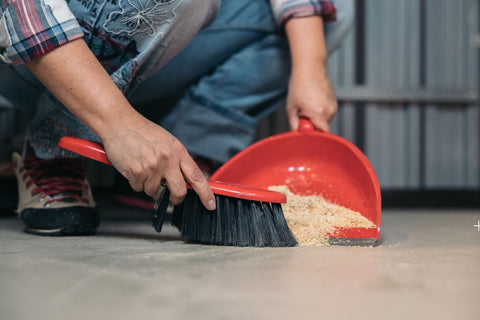If you're passionate about woodworking, you'll understand the sheer joy of crafting something by hand, such as storage for your wooden jewelry. Handmade wooden jewelry boxes are great for this purpose indeed. However, this joy often comes with an aftermath of the mess that can quickly turn your workshop into a chaotic scene.
It's crucial to understand that a well-organized workshop not only improves productivity but also helps protect your precious tools and creations.
So, whether you're a seasoned woodworker or a newbie to the craft, these straightfrward steps will take you from chaos to cleanliness in no time.
Here are the tips for organizing and cleaning your woodworking sanctuary:
Tips For Cleaning Your Workshop
Keeping your shop clean elevates your crafting experience and ensures it's safe and healthy to work in such an environment. Therefore, you should regularly clean your workshop to ensure it meets the required standards. Here's how to get it done.
Hiring Professional Cleaners
Have you considered hiring professional cleaners? It's an excellent choice, especially if you're dealing with an extensive mess or need more time. Retail store disinfecting services often provide specific packages tailored to workshops, ensuring a deep, thorough clean. You'll be surprised how rejuvenating a professionally cleaned workshop can feel.
Though it's an additional expense, the benefits you reap—a spotless environment and saved time—are worth it. So, don't hesitate to explore this option if it suits your needs and budget.
However, if you want to explore DIY options, then you can try the following:

Cleaning Tools And Work Surfaces
Next, focus on your tools and work surfaces. Regular cleaning preserves your tools' lifespan and keeps your work surfaces clear. Don't let dust and grime buildup ruin your precious equipment.
Use a dry cloth for initial dusting, followed by an appropriate cleaner for the material of your tools. Always remember to dry them properly to prevent rusting.
Proper Disposal Of Wood Scraps And Sawdust
Pay attention to the importance of proper waste disposal. Wood scraps and sawdust can accumulate quickly, causing potential fire hazards and cluttering your workspace. Regularly sweep up sawdust and dispose of it safely.
Consider recycling or repurposing larger wood scraps. Smaller ones might serve as kindling if you have a safe burn area.
Deep Cleaning: Floors, Windows, And Storage Areas
Additionally, remember to clean your workshop deeply occasionally. This involves your floors, windows, and storage areas. These spots are often forgotten when cleaning shops but are crucial for keeping your workshop organized and safe.
Sweep and mop your floors regularly to keep dust and debris at bay. Clean windows invite more light, creating a pleasant working atmosphere. For storage areas, occasional wiping and airing out can prevent mold and mildew.
Clearing Out And Decluttering
Another important step in cleaning your workshop is decluttering your space. Start by removing all unnecessary items. You'd be amazed at how much space you'll free up. Old projects, surplus materials, or broken tools? If they're not serving you, it's time to dispose of.
After the initial purge, sort the remaining items. A place for everything and everything in its place. This principle goes a long way in maintaining a clean workshop.
Tips For Arranging Your Workshop
After cleaning your workshop, it's time to organize your space efficiently. This isn't just about tidying up; it's about designing a workspace that boosts your productivity and safeguards your tools.
Here are few strategies that can help you keep your shop neat and orderly.
Implementing Zones
Creating specific zones in your workshop is a game-changer. Imagine knowing exactly where to find a tool when you need it! First, designate an area for actual woodworking. This should be a spacious spot where you can easily handle your projects.
Next, create a storage area where all your tools, materials, and finished products reside.
Finally, set a finishing zone to apply those final touches to your crafts. Your zones will depend on your workshop's size and the nature of your projects.
When arranging your zones, consider the flow of your work. You wouldn't want to walk across the workshop to get a tool, would you? Arrange your zones in a way that mimics the workflow.
For instance, the storage area could be near the work zone for easy access to tools.
Having The Right Storage
Storage is a crucial part of organizing any workshop. It's where your tools and materials will call 'home.' Shelves and cabinets are great for keeping things off the floor.
They can house materials, finished crafts, and even some of your smaller tools. Ensure that they are sturdy and spacious enough for your needs.
Toolboxes, on the other hand, are perfect for keeping your tools organized. A well-organized toolbox saves you time searching for tools and protects them from damage. When choosing a toolbox, consider its size and compartments. You'll need something that can accommodate all your tools and is easy to navigate.
Ensuring Proper Labeling
Lastly, remember to label. This might seem trivial, but it makes a significant difference. Label your shelves, toolboxes, and even your zones. This way, you'll never forget where things belong.
Moreover, if others use your workshop, they'll know where to find and return items. It's a simple step that can save you time and confusion in the long run.
Having Proper Wall Organization
Never underestimate the power of your walls in aiding the organization. Installing a pegboard or a hanging system will use this often-overlooked space. Pegboards are versatile, allowing you to hang tools, rulers, tape, and more. You'll find everything quickly, and it's within arm's reach.
A hanging system can be anything from hooks to magnetic strips. They are excellent for storing tools that you frequently use. Just grab what you need, and when you're done, hang it back up.
Importance Of Organized And Clean Workshop
A clean and organized wood handicrafts shop is more than an aesthetic preference. It's a cornerstone for safety, productivity, and creativity. Here's why maintaining an orderly workshop is crucial:
Boosts Productivity
Having an organized workspace can significantly improve your productivity. When you know where everything is, you're not wasting valuable time searching for tools or materials. This swift resource access reduces frustration and keeps your creativity flowing.
Moreover, a well-ordered workspace allows you to focus entirely on your craft. It reduces visual clutter, which can distract your mind and impact the quality of your work. A tidy workshop sets the stage for an efficient and enjoyable crafting experience.
Enhances Safety
Next, an orderly workshop is a safer workshop. Woodworking involves using sharp tools and machines, which, if left haphazardly around, can cause accidents. By ensuring each tool has a designated place, you're reducing the risk of unexpected injuries.
Additionally, wood scraps and sawdust can become hazardous if not managed properly. They can cause slips and falls or even become a fire risk. Regular cleanups and having waste disposal systems in place can drastically reduce these safety hazards.

Prolongs Tool Life
An organized shop also contributes to the longevity of your tools. Tools that are thrown together in a drawer can get damaged, leading to premature wear and tear. Proper organization and storage protect your tools from damage, thereby prolonging their life. Regular cleaning also helps to keep your tools in top working condition. Removing sawdust and debris from your tools after each use prevents rusting and maintains the tool's performance, saving you money in the long run.
Fosters Creativity
Finally, an organized and clean environment fosters creativity. A tidy workspace is like a blank canvas—it invites creative ideas and experimentation. In contrast, a cluttered space can stifle creativity and make it easier to start new projects.
Maintaining Your Organized Shop
Maintaining a clean and organized wood handicrafts shop isn't a one-time event. It's a continuous process that requires a bit of effort daily. Here are tips for maintaining your workshop:
Regular Cleanup
Cleaning up your shop regularly isn't just about aesthetics; it's about functionality. Regular cleanups make you less likely to misplace tools or stumble upon forgotten materials. Plus, it can boost your productivity. If you can find everything quickly, you can focus more on your projects and less on searching for the right tool.
It's also a safety issue. Sawdust, scraps of wood, and other debris can be hazardous. Regular cleanups reduce the chances of accidents, ensuring that your workshop remains a safe space for you to unleash your creativity.
Scheduled Reorganization And Decluttering
Even with regular cleanup, it's vital to schedule in-depth reorganizations. This allows you to assess your shop's current organization and make necessary changes. As your projects evolve, so do your needs. Reorganizing can help you accommodate these changes.
Scheduled decluttering is also vital. Over time, you might accumulate materials or tools you no longer use. Scheduling decluttering sessions allows you to remove these unnecessary items, creating more space and reducing clutter.
Quick Daily Habits For A Tidy Shop
Lastly, forming quick daily habits can do wonders for maintaining your shop's cleanliness. At the end of each day, take a few minutes to put away tools, sweep up sawdust, and wipe down work surfaces. It's a small task, but it can make a difference.
Starting your day in a clean, organized shop can set a positive tone for your workday. It reduces stress and can lead to a more enjoyable and productive day. These habits take minimal time but significantly impact your shop's overall tidiness and work efficiency.
Conclusion
A clean and organized wood handicrafts shop boosts your productivity, enhances safety, and allows for a smoother creative process. Regular cleanup, scheduled reorganizations, and quick daily habits are the keys to maintaining your workspace.
Now, it's your turn to begin the transformative journey of decluttering and reorganizing your shop. Embrace these practices as part of your woodworking craft and enjoy the benefits of a well-ordered and efficient workspace.
ABOUT THE AUTHOR
Aleksandra Djurdjevic
Senior Content Creator
Aleksandra Djurdjevic is a senior writer and editor, covering jewelry, accessories, and trends. She’s also works with services, home décor. She has previously worked as ESL teacher for English Tochka. Aleksandra graduated from the Comparative Literature department at the Faculty of Philosophy in Serbia. Aleksandra’s love for the environment, crafts and natural products over the years helps her continue to be a top expert at Wooden Earth.






